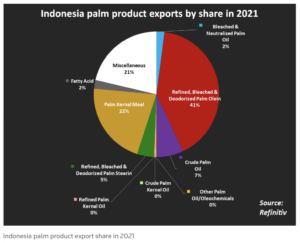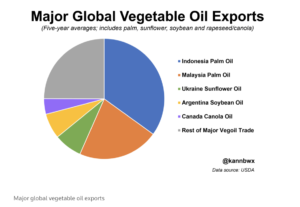As 2026 ushers in a fresh start, agricultural economists say the U.S. farm economy has stopped sliding, but it’s far from fully healed.The December Ag Economists’ Monthly Monitor shows month-to-month…
Indonesia Widens Palm Oil Export Ban, Protectionist Measure Adds to Existing Pressure on Edible Oils
Bloomberg writers Eko Listiyorini, Anuradha Raghu, and Rieka Rahadiana reported yesterday that, “Indonesia, the world’s biggest edible oils shipper, will widen an export ban to include crude palm oil, adding to uncertainty in a market that’s suffered dizzying price swings and threatening to worsen global food inflation.
“The ban will be expanded to crude palm oil, RBD palm oil and used cooking oil, Coordinating Minister for Economic Affairs Airlangga Hartarto said at a briefing Wednesday. A day earlier, he said the halt would only apply to palm olein. The policy will start on April 28 and last until domestic cooking oil prices ease.
“Indonesia’s export policy has sent the palm oil industry into a tailspin. Prices have been whipsawed, rising one moment as the lack of details from the initial statement had traders fearing that the ban would cover all products, then slumping the next as details emerged that the move would be restricted to certain refined goods. Futures rallied 10% just before the latest announcement.”

Bloomberg writers Megan Durisin and Kim Chipman reported today that, “Soybean oil traded around record levels in Chicago as Indonesia’s sweeping ban on palm oil exports further stretches global supplies of commodities used in everything from cooking to cosmetics and fuel.”
“Indonesia’s move threatens to drive up costs even more across multiple supply chains at a time of rampant inflation. It also makes it vital that farmers in big oilseed regions like North America produce bumper crops this year,” the Bloomberg article said.
However, Reuters columnist Karen Braun noted yesterday that, “Thinning vegetable oil supplies have driven global prices to record levels this year, so Canadian farmers’ intentions to cut canola plantings this spring are not among helpful remedies.”
Braun pointed out that, “Canola/rapeseed oil occupies the smallest world export share among the four major vegetable oils at 7%, but the market is already under high pressure with Ukraine’s sunflower oil exports offline and major disruptions to Indonesia’s palm oil shipments starting this week.

“Statistics Canada on Tuesday pegged Canada’s 2022 canola plantings at 20.9 million acres, down 7% from last year, 6% below the five-year average and lighter than analyst expectations of 22.1 million.”
Also yesterday, Wall Street Journal writer Jon Emont reported that, “Palm oil is one of the world’s most ubiquitous food commodities, found in candy bars, ice cream, pizza dough and cooking oil. It is about to get harder to source.
“Starting Thursday, Indonesia—which accounts for 60% of global supply—will stop palm-oil exports, a sweeping decision that will make cooking meals more expensive for families around the world and cause headaches for a range of food and cosmetics manufacturers. The ban follows a sharp rise in cooking-oil prices at home, caused in large part by disruptions stemming from Russia’s invasion of Ukraine.”
The Journal article noted that,
Indonesia’s policy is the latest example of protectionist measures as countries act to secure their own food supply amid rising prices. U.S. Treasury Secretary Janet Yellen in a mid-April speech urged governments to avoid export restrictions that could further drive up prices.
Emont stated that, “Some palm-oil analysts estimate that the ban will likely last only for a few weeks, as Indonesia has limited storage capacity and its exports are a key source of foreign exchange. Still, its impact will be widely felt.”
Reuters writers Ange Aboa and Joe Bavier reported yesterday that, “Neither Russia nor Ukraine produces palm oil, a tropical commodity, but Moscow’s invasion has triggered knock-on effects across today’s intricately interconnected global economy.
“The conflict has helped propel prices for palm oil – ubiquitous in African dishes from Nigerian jollof rice to Ivorian sticky alloco plantains – to record highs that experts say will deepen a food-cost crisis and punish the poorest.”
And Reuters News reported today that, “Indonesia’s navy seized two tankers carrying crude palm oil, palm olein and methanol for what it said were permit and paperwork violations, in an operation conducted a day before a palm oil export ban took effect, it said on Thursday.”
Meanwhile, Associated Press writers Dee-Ann Durbin, Ayse Wieting and Kelvin Chan reported earlier this week that, “Some supermarkets in Turkey have imposed limits on the amount of vegetable oil households can purchase after concerns about shortages sparked panic-buying. Some stores in Spain, Italy and the United Kingdom also have set limits. German shoppers are posting photos on social media of empty shelves where sunflower and canola oil usually sit. In a recent tweet, Kenya’s main power company warned that thieves are draining toxic fluid from electrical transformers and reselling it as cooking oil.
“‘We will just have to boil everything now, the days of the frying pan are gone,’ said Glaudina Nyoni, scanning prices in a supermarket in Harare, Zimbabwe, where vegetable oil costs have almost doubled since the outbreak of the war. A 2-liter bottle now costs up to $9.”





